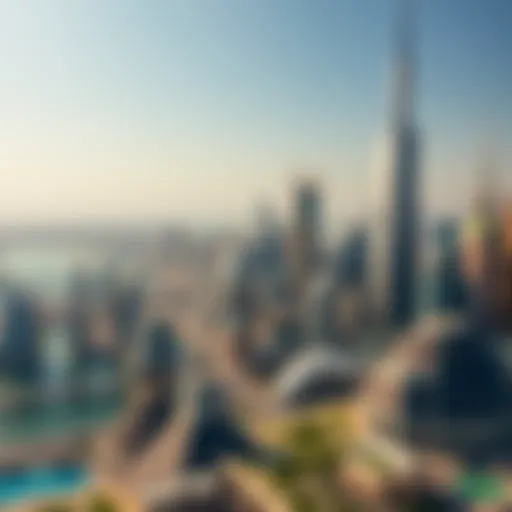Understanding the Dubai Real Estate Market Dynamics
Intro
Dubai's real estate market has earned a reputation as a dazzling hub for investors and prospective homeowners alike. Yet, unless you've strolled down the glittering streets of Downtown Dubai, it's tricky to grasp just how dynamic things can get. With its remarkable skyline and diverse property offerings, it's easy to get swept away by the allure. However, beneath this shiny facade lies a marketplace with a mixture of opportunities and challenges that need careful navigation.
Before you jump into the deep end, understanding where the market currently stands is crucial. Factors like supply and demand, regulatory frameworks, foreign investment policies, and shifting demographics shape the reality of real estate in Dubai. All can be turning points for those looking to snare a slice of the local property pie.
This piece takes you through the ins and outs of the Dubai real estate landscape. From current trends and future projections to hotspots for investment, each segment equips readers with knowledge that can make or break an investment decision. So whether you're a seasoned investor keeping an eye on price shifts, a homebuyer contemplating an abode, or a real estate agent navigating these waters, this is your go-to guide.
Let's dive deeper into the Dubai real estate market to grasp its trends, investment opportunities, and everything in-between.
Market Trends in Dubai Real Estate
Current Market Overview
To kick things off, it’s essential to gauge the current climate of the Dubai real estate market. A mix of high-end luxury properties and affordable housing caters to a wide range of buyers. According to recent reports, the market has shown signs of recovery post-pandemic. Notably, there’s been significant activity in property transactions, with more individuals looking to settle in the city, whether for business or lifestyle reasons.
Another interesting facet is the government's encouragement of foreign investment through policies that make it relatively easy to purchase property in Dubai. This is not just drawn from the attractive perks of freehold ownership, but also the opportunity to attain residency visas, creating a win-win situation for investors.
Price Trends and Forecasts
Keeping an eye on price trends is vital for making informed decisions. In 2023, property prices in some neighborhoods have seen a steady incline, signaling a robust demand. Areas like Dubai Marina and Palm Jumeirah continue to attract foreign buyers, often fetching premium prices, while burgeoning neighborhoods like Dubai Hills Estate and Jumeirah Village Circle are seeing a favorable uptick as well.
“According to data from Property Finder, property prices in Dubai have appreciated by over 10% year-on-year in some areas.”
Looking ahead, analysts are optimistic about continued growth, albeit with a note of caution. Factors such as fluctuations in global economic conditions and potential regulatory changes could influence the pace of this growth. Forecasts suggest that while the luxury market is robust, mid-market segments may offer better value propositions as buyers seek more budget-friendly options.
Investment Opportunities
Hot Areas for Investment
When it comes to potential investment areas, some neighborhoods are catching investors' eyes like bees to honey. Apart from the usual suspects like Dubai Marina and Downtown, areas like Dubai South and Al Furjan have emerged as attractive for their development potential and upcoming infrastructure projects. Not only do they promise good capital appreciation, but they also often come with lower price tags compared to their more established counterparts.
To give you a clearer picture, here’s a short list of up-and-coming neighborhoods:
- Dubai South: Close to the Expo 2020 site and set to benefit from extensive developments.
- Al Furjan: Boasting growing amenities and appealing to families who want residential comforts.
- Dubai Hills Estate: Offers a blend of luxury and practicality with parks and schools within reach.
Rental Yield Analysis
Diving into the rental market, understanding yield is paramount for those eyeing investment purely for returns. Many areas in Dubai are yielding impressive rental returns, often reaching between 7-9%, significantly higher than what you might find in other international hubs. Properties designed for families or positioned near business hubs tend to see a quicker turnaround in tenants, ensuring consistent rental income.
In this context, comparing rental yields in different neighborhoods can reveal lucrative avenues for further exploration. It’s also worth noting that laws surrounding rental agreements are straightforward, making it a relatively hassle-free endeavor for landlords.
With the right mix of research and strategic approach, the potential to profit from real estate investments in Dubai is quite promising.
Overview of the Dubai Real Estate Market
The real estate landscape in Dubai serves as a vibrant tapestry reflecting the dynamic economic growth and cultural evolution of the city. Understanding the intricacies of this market is essential for investors, homebuyers, and real estate agents alike. Whether you're eyeing a luxury villa in Palm Jumeirah or considering an apartment in Downtown Dubai, having a grasp of overarching trends and historical context is crucial.
Historical Context and Growth
Dubai's real estate journey began in earnest during the late 20th century, particularly with initiatives aimed at diversifying the economy away from oil dependence. The property market started flourishing in the early 2000s, spurred by rapid urban development and liberalization policies that attracted foreign investments. The introduction of freehold property ownership for expatriates in 2002 marked a pivotal moment, effectively opening the floodgates for overseas buyers.
From towering skyscrapers like the Burj Khalifa to expansive man-made islands, the skyline encapsulates years of ambitious projects and visionary architecture. The emirate witnessed a construction boom, with reputable developers such as Emaar Properties and Damac Properties leadng the charge. Between 2002 and 2008, property prices surged, but the global financial crisis led to a downturn, presenting both obstacles and opportunities.
With measures taken by the government post-recession to stabilize the market, Dubai's real estate sector gradually regained its footing. Today, the market showcases a blend of residential, commercial, and mixed-use properties, drawing investors intrigued by both short-term yields and long-term capital appreciation.
Current Market Trends
As we discuss the present landscape, it's imperative to look closely at factors shaping the current real estate climate.
- Price Fluctuations: The market experienced fluctuations, but recent trends indicate a more stable pricing structure. The following elements are contributing to the shift:
- Rental Demand: With many opting for rental instead of purchase, areas like Dubai Marina and Jumeirah Beach Residence are thriving. High rental yields and attractive amenities make these locales appealing.
- Sustainability Initiatives: Green building certifications and eco-friendly developments are on the rise. Developers are integrating sustainability into project designs, appealing to socially conscious investors.
- Technological Influence: The use of innovative technologies for virtual tours, property management, and transaction processes is gaining momentum, offering more convenience to buyers and sellers.
- An influx of expatriates seeking housing due to UAE's lenient visa regulations.
- A notable rise in demand for off-plan properties as developers offer attractive payment plans.
Understanding these trends is pivotal as they indicate not only the pulse of the current market but also potential future movements. By observing the patterns, stakeholders can position themselves advantageously within this ever-evolving market.
"Staying ahead of the curve in Dubai's real estate requires a keen sense of the changing tides. Each trend not only influences current conditions but also shapes future opportunities."


In summary, the Dubai real estate market, characterized by its past growth and present dynamism, is a critical area for anyone looking to invest or engage in property transactions. It has become a melting pot of architectural innovation and cultural diversity, making it an exciting sector to be part of.
Key Drivers of Dubai Property Value
Understanding the key drivers behind property value in Dubai is essential for investors and homebuyers alike. The real estate arena in this city is anything but stagnant; it's a dynamic landscape that responds rapidly to shifts in population, economics, and even global relations. A solid grasp of these influences can mean the difference between making a profitable investment or a costly mistake.
Population Growth and Demographics
Dubai has seen remarkable growth in its population over the past few decades. From a humble fishing village, it has burgeoned into a global metropolis attracting individuals from across the globe. The rise in population contributes significantly to property demand. People flock to Dubai for its work opportunities, tax benefits, and quality of life.
The city's demographic profile is diverse, with many expatriates making up a substantial portion of its residents. This cultural melting pot means different needs and desires when it comes to housing. For example, expats might lean toward furnished apartments or gated communities that reflect their lifestyle desires, while locals might prefer villa-style homes with more space and gardens.
These differing preferences can drive up property values in specific areas. Neighborhoods like Dubai Marina or Downtown Dubai are often highly sought after by younger professionals looking for trendy living arrangements, while families might gravitate towards places like Arabian Ranches. As each demographic group seeks its ideal living space, property owners often see fluctuating values based on demand.
Economic Factors Influencing Prices
Another critical factor that shapes property value in Dubai is the economic environment. The emirate’s economy is robust, primarily driven by tourism, finance, and trade.
- Tourism Impact: Dubai's reputation as a tourist hotspot adds fuel to the property fire. More tourists mean more short-term rental opportunities, increasing property attractiveness for investors.
- Job Market Variability: The job landscape also plays its role. When the economy is booming and new businesses are sprouting like daisies, property demands spike as people seek homes close to work. Conversely, during downturns, property values might plateau or decline.
- Government Initiatives: Progressive policies, such as visa reforms or affordable housing projects voiced by local authorities, also hold sway over market dynamics. Recent shifts aimed at retaining more expats and encouraging investment have made previously unreachable properties more accessible, opening new avenues for many.
In summary, familiarity with these economic undercurrents not only offers investors insights but also helps families identify the right timing for their purchases. By keeping an eye on economic shifts and demographic changes, parties interested in Dubai’s property market can anticipate trends that ultimately influence real estate values.
Types of Properties Available
Navigating the diverse offerings within Dubai's real estate market is a crucial step for investors and homebuyers alike. Recognizing the types of properties available allows potential buyers to align their choices with their unique requirements and aspirations. Each category—residential and commercial—presents distinct advantages and challenges. Understanding these elements can significantly impact decision making, ensuring that investments not only fulfill immediate needs but also yield future benefits.
Residential Properties
Villas
Villas in Dubai present an appealing option for those looking for luxury and space. These properties are typically standalone homes and often come with private gardens and pools. A villa’s appeal lies in its spacious layout and the degree of privacy it affords.
One of the key characteristics of villas is their aesthetic versatility. Buyers can find options ranging from traditional Arabic designs to modern, sleek styles, appealing to both cultural preferences and contemporary tastes. This flexibility has made villas a popular choice for families looking for a comfortable living environment.
However, potential buyers should consider the associated maintenance costs, which can be significant. Additionally, villas are usually located in outskirts or gated communities, which may mean longer commute times to central business areas.
Condos
Condos, or condominiums, encapsulate a different lifestyle choice, often appealing to professionals and individuals seeking convenience. A defining feature of condos is their communal residential model, where units are owned privately while amenities like gyms, pools, and common areas are shared.
The appeal of condo living stems from its low-maintenance lifestyle. Many buyers are drawn to the convenience of having security and maintenance handled by property management. This can be particularly enticing for expatriates, who might not want to invest time in property upkeep.
Yet, condo owners should be aware of homeowners’ association fees and the potential for restrictions on renovations or rentals, which may limit personal choices regarding their living space.
Apartment Complexes
Apartment complexes offer a blend of affordability and community living, catering to a vast demographic in Dubai. Often featuring several units within a building, they provide various layouts and sizes to meet the needs of different households.
This type of property is an attractive option for first-time buyers and investors looking for rental income. Apartment complexes often have lower entry costs compared to villas and are typically located in urban areas with easy access to transportation and amenities, making them highly desirable.
However, it is crucial to consider the potential for noise and lack of privacy in such densely populated settings. Choices around location and building management can significantly influence not only daily living conditions but also future property value and investment return.
Commercial Real Estate
Office Spaces
Office spaces in Dubai play a pivotal role in the city’s economy. These properties are essential for businesses looking to establish a permanent presence in one of the fastest-growing markets in the world. One of the standout features of Dubai's commercial spaces is the sophisticated infrastructure they offer, typically equipped with modern facilities conducive to diverse business needs.
Choosing the right office setting can be crucial for company image and operational efficiency. Businesses often prefer locations within established commercial districts, which can boost brand status and client footfall. However, securing prime office spaces can mean higher rental costs, so it’s wise for companies to assess long-term financial viability before diving in.
Retail Outlets
Retail outlets represent another significant sector within Dubai’s commercial real estate landscape. These spaces can range from small boutique stores to large chain retailers, and their significance is largely driven by the booming consumer market in the city.
A key characteristic of retail spaces is foot traffic; locations near popular attractions or busy areas tend to perform better. However, the competitive nature of retail requires careful market analysis and business planning to ensure sustainability and profitability.
The flip side is the potential for high overhead costs in prime locations, which can impact overall profitability, particularly for start-ups or smaller businesses.


Warehousing Facilities
As e-commerce continues to flourish, warehousing facilities have become increasingly crucial in Dubai's real estate market. These properties are designed to support logistics, distribution, and online retailing, making them essential for businesses looking to maximize their operational efficiency.
The advantage of warehousing sites includes large space availability and logistical accessibility, which can significantly reduce logistical costs for a business.
However, potential investors should consider the area’s zoning regulations and geographical factors, as these can affect accessibility for vehicles and shipping, influencing overall operating costs and business agility.
Investment Opportunities in Dubai
Understanding the investment opportunities in Dubai's real estate sector is crucial for potential buyers and investors. The landscape is constantly shifting, driven by various factors that can either elevate market potential or present risks. In this section, we delve into the key elements that define the investment scene in Dubai, including specific areas ripe for investment and the divide between luxury and affordable housing options.
Emerging Areas for Investment
Dubai is not just about its high-profile neighborhoods like Dubai Marina or Downtown. The emirate is home to emerging areas that offer lucrative prospects for savvy investors. For instance, Dubai South, which is situated near the Al Maktoum International Airport, has been earmarked as a major development hub. With plans for a new business district and significant residential complexes, it’s garnering attention from investors looking for growth potential.
Moving further out, Dubai Investments Park is catching the eye with its blend of residential, commercial, and industrial properties, making it a versatile option for mixed-use developments. Investors are increasingly considering areas like Jumeirah Village Circle and Dubai Studio City, which offer more affordable pricing compared to established districts, yet are poised for growth.
"Investing in Dubai's emerging neighborhoods can lead to significant returns, particularly as infrastructure continues to improve."
These areas not only provide affordable entry points but also present boundless possibilities, especially as the city prepares for global events like Expo 2025, which are projected to bring in new residents and businesses. The foresight in investing in these zones today can yield substantial returns in the near future.
Luxury vs. Affordable Housing
When it comes to housing options in Dubai, there’s a clear distinction between luxury and affordable segments, each catering to different buyer profiles and investment strategies. Luxury housing remains a strong magnet for both local and international investors. Towering skyscrapers like the Burj Khalifa and lavish beachfront villas in Palm Jumeirah offer high-end amenities that justify their premium pricing. The allure of opulence, combined with excellent rental yields, forms a tempting package for wealthier buyers or those seeking a foothold in Dubai's exclusive market.
On the flip side, affordable housing is becoming increasingly important. With a growing population of expatriates and middle-class locals, the demand for budget-friendly options is on the rise. Residential developments in neighborhoods like Al Barsha and Dubai Sports City address this need, making them an attractive proposition for investors targeting long-term rental markets.
When deciding between luxury and affordable housing, here are a few key considerations:
- Target Audience: Understand who will be living in your property—luxury seekers or families aiming for affordability.
- Return on Investment: Analyze rental yields and capital appreciation for both options.
- Location Dynamics: Proximity to schools, offices, and public transport plays a critical role in desirability.
Both segments have their respective advantages, and choosing wisely requires understanding your long-term goals in the Dubai real estate market. Understanding the nuanced dynamics of each sector will ultimately shape your investment strategy, allowing you to navigate the market's complexities effectively.
Legal Framework for Property Ownership
Understanding the legal framework for property ownership in Dubai is crucial for any investor or homebuyer navigating this bustling market. For many, the intricacies involved with laws and regulations can feel like trying to find a needle in a haystack. However, grasping these concepts is essential as it not only protects your interests as a buyer but also influences the overall investment climate in the emirate.
Ownership Rights for Locals and Expats
Dubai stands out for its unique approach to property ownership, especially when compared to other cities in the region. For locals, ownership rights are relatively straightforward. Citizens can own freehold properties in designated areas. The government promotes local ownership as part of its broader economic goals.
Conversely, the rules for expatriates are a bit more nuanced. Foreigners can also own freehold properties in specified areas known as freehold zones, like Dubai Marina or Palm Jumeirah. This legal structure allows expats access to the lucrative market while ensuring that these investments contribute to the local economy. There are some caveats though—ownership for non-residents can sometimes imply additional financial burdens such as higher taxes.
“In Dubai, understanding the laws around property ownership is as critical as understanding the market.”
It’s also vital for both locals and expats to familiarize themselves with the regulations regarding leasehold agreements, which typically allow ownership for a period, often up to 99 years. This can be an attractive option for individuals looking to invest without large initial capital.
Regulatory Authorities and Their Role
When diving into Dubai’s real estate landscape, it’s important to recognize the role of various regulatory authorities. The Dubai Land Department (DLD) is the key player when it comes to real estate transactions. This body oversees the registration of properties, ensuring that all transactions comply with local laws. Without the DLD, the entire process could be as chaotic as a hornet's nest.
Additionally, the Real Estate Regulatory Authority (RERA), part of the DLD, handles disputes and sets frameworks that govern real estate practices. They offer guidelines that protect buyers and sellers alike, promoting transparency and trust in the market. These regulations are pivotal in creating a reliable environment for investors.
Another significant authority is the Dubai Investment Development Agency (Dubai FDI), which encourages foreign investment by providing resources and support. They allow investors to grasp the legal landscape better and understand potential challenges.
In summary, the legal framework surrounding property ownership in Dubai is centered on promoting accessibility while ensuring both local and foreign investors remain protected. By navigating this system, individuals can make informed choices, ensuring their real estate ventures are both profitable and secure.
For a more detailed exploration of these regulations, you can visit Dubai Land Department.
Understanding these facets of the property landscape is not a trivial matter. It is the foundation upon which successful investments and homeownership are build.
Financing Property Purchases
Financing property purchases is a critical component of the real estate market, especially in a vibrant arena like Dubai. This facet not only shapes the decisions of buyers but also heavily influences the overall dynamics and health of the property market. Understanding the various types of financing available can empower both investors and homebuyers to make informed choices, ensuring that they find solutions that align with their financial capabilities and investment goals.
In Dubai, where properties can range from luxurious high-rises to modest villas, discerning buyers must navigate an array of financing options. Having a clear grasp on these avenues helps in maximizing the potential return on investment while minimizing financial strain. Additionally, it can be advantageous to grasp how financing works in this particular region, as it differs in many respects from other global markets.


Mortgages for Residents and Non-Residents
Obtaining a mortgage can be both a straightforward and complex process, depending on one’s residency status. For residents, the options tend to be more abundant. Local banks and financial institutions often provide competitive rates and terms. Typically, expatriates who hold residency permits can access mortgages up to 80% of the property’s value, contingent on various factors like income, credit history, and employment status.
For non-residents, the situation can be trickier. Many banks are cautious, often offering mortgages ranging from 50% to 70% of the property's value.
Some important points to keep in mind are:
- Eligibility Criteria: Non-residents must show strong financial stability and may encounter stricter credit checks.
- Interest Rates: These can be higher for non-residents, reflecting the increased risk taken on by lenders.
- Documentation Needs: Non-residents often need extensive documentation, including proof of income and tax returns from their home country.
Securing a mortgage as a foreign buyer isn’t impossible, but it's wise to conduct thorough research and consult with mortgage brokers familiar with the Dubai market to get tailored advice.
"Education on financing options is vital to ensure buyers secure favorable terms that align with their financial situation."
Alternative Financing Options
In addition to traditional mortgages, several alternative financing options exist in Dubai’s real estate market. These alternatives often present unique advantages and might be suitable for those looking to diversify their investment strategies.
- Developer Financing: Many property developers offer financing plans directly to buyers. This can often come with favorable terms, such as lower interest rates or payment plans that align with the construction phases of a property.
- Islamic Financing: Popular among both locals and expatriates, Islamic finance adheres to Sharia law, providing unique structures such as Murabaha and Ijara. These structures generally avoid interest, replacing it with profit-sharing agreements or leasing.
- Peer-to-Peer Lending: A relatively new concept, peer-to-peer platforms allow individuals to invest directly with borrowers, often yielding better returns than traditional savings or investment approaches.
- Equity Release: For those already owning property, releasing equity can provide a means to finance another purchase without taking on additional debt.
Each of these options carries its own set of pros and cons. Interested investors should weigh them carefully, considering their long-term financial objectives. Thorough discussions with financial advisors can shed light on which option may best suit their unique needs and aspirations.
Property Management Considerations
Managing property in Dubai can be quite the endeavor, especially given the diverse landscape of investment opportunities and regulations. The importance of property management cannot be overstated; it plays a crucial role not just in preserving the value of your investment but also in enhancing the overall experience of both owners and tenants. Good management can mitigate issues like maintenance delays and tenant disputes, ultimately leading to smoother transactions and increased profitability. After all, a well-managed property is synonymous with demand, which directly influences rental yields and resale value.
Self-Management vs. Hiring Professionals
When choosing how to manage your property, one must consider the pros and cons of self-management versus hiring a property management company. Many investors may initially lean towards self-management to save on costs. However, this approach requires a significant time investment and thorough knowledge of local laws and market conditions.
On the other hand, hiring professionals brings their expertise into play. Property management companies like Emaar Properties, which have been around for a long time, know the ins and outs of Dubai’s rental market. With their connections, they can fill vacancies faster and often have preferred vendors for maintenance tasks. Moreover, they handle tenant relations and can free you from the burdens of day-to-day management.
However, the trade-off is typically a percentage of your rental income, which could eat into your profits. Evaluating your personal capacity, knowledge, and willingness to engage in property management duties will help clarify which option suits you best. The key question to ask yourself is: “Am I equipped and willing to take this on, or do I need specialized help?”
Maintenance and Upkeep
Maintenance forms the backbone of property management. Regular upkeep is vital to prevent larger, more expensive repairs down the road. Much as keeping your car in good condition ensures it runs smoothly, maintaining your property preserves its value.
A comprehensive maintenance plan should involve both routine inspections and addressing immediate repairs. Many owners overlook the importance of seasonal maintenance, such as checking HVAC systems or dealing with potential water damage during the rainy season. Failing to keep on top of these can turn minor issues into significant headaches.
Moreover, establishing a reliable relationship with service providers can be advantageous. This might include plumbers, electricians, and cleaning services. Building a network can guarantee prompt service when problems inevitably arise. More importantly, maintaining open lines of communication with your tenants about their needs can ensure that their satisfaction remains high, greatly benefiting rental renewals.
"Effective property management is all about consistency. A well-maintained property reflects positively on the owner while ensuring tenants are satisfied."
Being proactive in your maintenance approach not only enhances the life of your property but will also attract high-quality tenants looking for a place they can call home without worrying about immediate maintenance tasks. Balancing self-management and professional help, coupled with a robust maintenance strategy, can significantly elevate your property investment in Dubai.
The Future of Real Estate in Dubai
The future of real estate in Dubai holds a world of promise and potential, shaping itself as a dynamic sector packed with opportunities. Understanding the importance of this topic is crucial for anyone investing in the region. As we look towards tomorrow, several factors come into play, guiding investors and homeowners in their decision-making processes. The evolving landscape denotes not just growth but a shift towards sustainable and tech-savvy practices that align with global trends.
Sustainable Development Trends
In Dubai, sustainability is not just a buzzword; it’s fast becoming a core principle of urban planning and property development. The goals set by the UAE government to reduce carbon emissions and promote eco-friendly practices are reshaping the real estate scene. Several initiatives, like the Dubai Clean Energy Strategy 2050, highlight this commitment. Here are some prominent trends:
- Green Building Standards: Developers are increasingly focusing on eco-friendly construction, using materials that minimize environmental impact.
- Energy Efficient Design: Properties are designed to optimize energy usage, leveraging advancements in technology to control consumption effectively.
- Integrated Community Living: Mixed-use developments encourage residents to live, work, and play in one area, reducing transportation needs and enhancing community connection.
The importance of these trends is manifold; they not only contribute to a healthier environment but also increase property values and attract like-minded investors.
"If we invest in sustainable properties now, we lay a foundation for the future generations to thrive."
Technological Innovations in Real Estate
Technological advancements are altering the landscape of real estate in Dubai, creating smarter ways to buy, sell, and manage properties. Innovations such as blockchain technology and Artificial Intelligence (AI), among others, have introduced efficiencies unheard of in traditional market practices. Consider the following impacts:
- Blockchain in Transactions: By using blockchain, transactions can become more transparent and secure, providing both buyers and sellers with peace of mind.
- Virtual Reality Tours: Investors now can tour properties remotely, making it easier to assess potential investments without the need to travel.
- AI Predictions and Analytics: Algorithms are enabling real estate firms to analyze market data more accurately, leading to better investment decisions and tailored solutions.
The integration of these technologies is not merely a fad; it signals a fundamental shift in how real estate operations will be conducted in the coming years, promoting a more efficient and user-friendly market.
For those looking to navigate this evolving landscape, staying informed and adaptable to these trends is key.
Further Reading:
- Learn more about sustainable developments at Wikipedia.
- Explore technological advancements in real estate on Britannica.
By understanding the future landscape of Dubai’s real estate, investors can make informed decisions that align with both market realities and personal aspirations.















